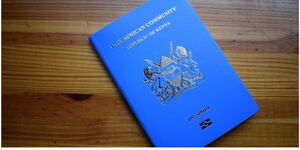Many Kenyans remember iconic hits of the early 2000's such as Mr Googz and Vinnie Banton's Githurai, E-Sir's Leo ni Leo, Ninanoki by Nameless featuring Amani and Maniacs' Anthem by Kleptomaniax.
What these songs have in common is that they were featured on 'Ogopa 1: Kenyan Club Classics', a compilation album by the record label Ogopa Deejays which is widely considered the pioneer of Kenya's urban sound.
What few people know, however, is that a secret deal struck between Ogopa and Radio Africa Group, which owns radio, TV and print operations including Kiss FM, played a major role in propelling the artistes, now household names, to stardom.
Talk of Kiss FM, then known as Kiss 100, prioritizing Kenyan music from Ogopa was considered little more than a rumour until Collins Majale aka Collo, one-third of Kleptomaniax, confirmed it in an interview for an online series known as 'The Play House' on April 28.
The deal, considered ahead of its time, involved Ogopa producing music to cater specifically to Kiss 100's target demographic at the time, young Kenyans between the ages of 18 and 24.
Hard-core hip-hop artistes from Dandora and K-South were ruling the airwaves when the deal was struck, with Radio Africa noting the growing demand for easy listening music among youngsters.
While the hard-core rap was popular, top 40 radio was taking over across the world with music that was easy to sing along to, with less complicated lyrics.
Collo explained that while their undeniable talent spoke for itself, the deal greatly influenced how music was produced at Ogopa.
"There was a deal that was done between Radio Africa and Ogopa. And at that time Kiss was a huge, Kenya-wide station playing nothing but fresh hits in collaboration with Ogopa Deejays.
"It was the best deal ever. It's crazy because at that time Dandora and Eastlands was producing some hard music, which was good but the market was hungry for something else," he stated.
Explaining that the deal played an understated role in the creative process that gave fans several hits, Collo went on to break down the kind of listener targeted by Kiss 100 at the time.
"The listener of Kiss 100 was 18 to 24. She was called Stella, they gave her a name. Stella goes to church, loves Jesus but she knows how to have a good time.
"She'll have her wine. She likes rap, but she also wants to dance it, and she doesn't want to hear many things. " he noted.
Ogopa 1 and it's follow-up, Ogopa 2, all featured several legendary Kenyan songs that were constantly on rotation on various radio stations. At the time, such a deal between a media house and record label was unheard of.
After achieving massive success with several hit singles including Tuendelee ama Tusiendelee and Swing Swing, Kleptomaniax eventually disbanded in 2009.
Collo went on to have a great solo career and eventually switched to gospel after getting saved. It was in this period of his life that he released hits including Bazo Kizo and Jijue.
Another of the group's members, Nyashinski, real name Nyamari Ongegu, stayed in the United States, where he had family, after the group toured over 20 states in 2007.
He made a headline-grabbing comeback to the country's music scene in 2016 with Now You Know, and has since released several popular songs establishing himself firmly among the most sought-after artists in East Africa.
Watch Collo's interview below:
{"preview_thumbnail":"/files/styles/video_embed_wysiwyg_preview/public/video_thumbnails/ZaAD5tLOkwQ.jpg?itok=iPm4aw5_","video_url":"https://youtu.be/ZaAD5tLOkwQ?t=274","settings":{"responsive":1,"width":"854","height":"480","autoplay":0},"settings_summary":["Embedded Video (Responsive)."]}












